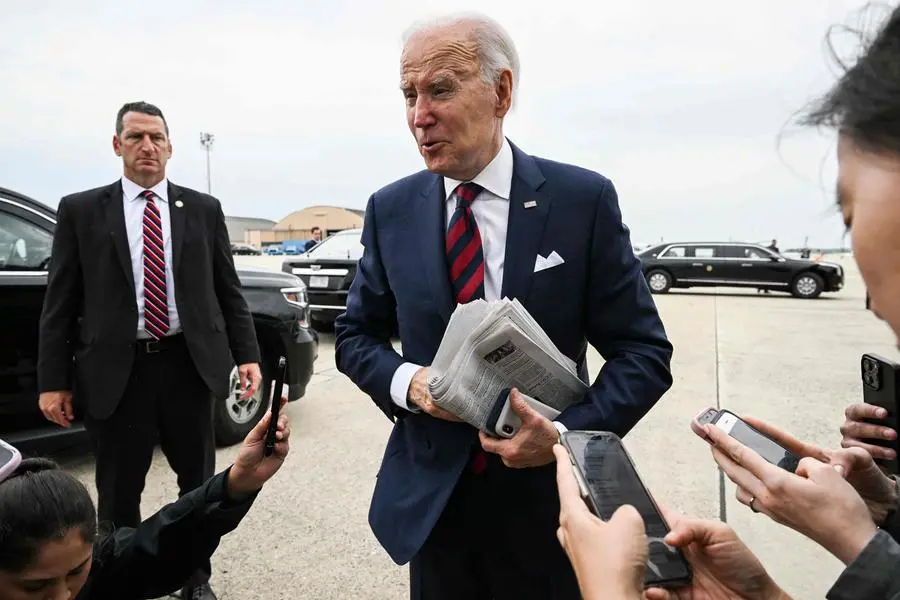PHOTO
President Joe Biden said Sunday he remains "optimistic" about finding an agreement with his Republican opponents to raise the US debt limit and avoid a default, which his administration warned would cause "catastrophic" consequences.
Congressional Republicans are demanding budget cuts in exchange for lifting the US borrowing limit, while the White House has insisted for months that the nation's credit should not be up for negotiation.
Alarm bells are meanwhile ringing over the possibility of a first-ever US default, with uncertainty over the actual date the government would stop being able to pay its bills.
The two sides have remained at an impasse despite weeks of warnings from government officials and bankers that a default could unleash drastic consequences, including a possible recession and likely global financial contagion.
Nonetheless, Biden said Sunday he thinks he will eventually be able to reach a deal.
"I remain optimistic because I'm a congenital optimist, but I really think there's a desire on their part as well as ours to reach agreement. I think we'll be able to do it," Biden told reporters while out on a bike ride near his beach home in Delaware.
A much-anticipated new round of debt-ceiling talks between Biden and Republican leaders, including House Speaker Kevin McCarthy, was postponed from Friday until the coming week.
Asked if the Tuesday meeting was still on, Biden said: "I think so."
Treasury Secretary Janet Yellen has warned a default could occur by June 1, while the nonpartisan Congressional Budget Office forecast on Friday the date of June 15.
"We shouldn't be here," Deputy Treasury Secretary Wally Adeyemo said Sunday on CNN's "State of the Union."
"If Congress failed to raise the debt limit by the time of default, we would go into a recession and it'd be catastrophic," he warned.
"The United States of America has never defaulted on its debt -- and we can't."
- 'Massive cuts' -
Biden has stated he wants a "clean" hike of the debt ceiling, but Republicans are insisting any extension of the country's borrowing authority, currently capped at $31.4 trillion, come with substantial curbs on spending.
"It's time to bring spending levels back to pre-Covid, and then we can talk about raising the debt ceiling," Byron Donalds, a Republican representative from Florida, told FOX News on Sunday.
"If Joe Biden brings nothing to the table, if all he does is sit there with his hands in his pockets... then he's the one leading our nation into default."
Former president Donald Trump on Sunday again encouraged his party to not give in, saying on Truth Social that "unless the Republicans get EVERYTHING they are asking for in terms of Cost Cutting," a default should be allowed to occur.
"Better now than later, especially with 32 Trillion Dollars of Debt out there," he added.
The looming possibility of a default has also threatened Biden's upcoming trip to Asia for a G7 leaders meeting, among other events in the region.
Asked by reporters on Sunday if he still planned to leave this week, Biden said: "That's my plan as it stands now," and as of Sunday evening, his official schedule showed him departing for Japan on Wednesday.
- 'Constructive' negotiations -
Deputy Treasury Secretary Adeyemo acknowledged "constructive" negotiations were ongoing at the staff level while pushing back on assertions that Biden does not want to address ballooning US debt.
"The president's laid out a plan that includes $3 trillion in debt relief over 10 years," Adeyemo said, referring to Biden's budget request unveiled in March, which featured tax increases on the wealthy and businesses.
Congressional leaders should address ways to hammer out a deal on fiscal policy, "but as we have that conversation, there is no reason we shouldn't raise the debt limit and prevent default in this country, a default that could lead to a massive recession that would cost us millions of jobs," he said.
Lael Brainard, director of the White House's National Economic Council, maintained that a deal would be reached.
"Our expectation is that Congress will do what is necessary" to avoid a default, Brainard, a former Federal Reserve vice chair, told CBS Sunday show "Face the Nation."
Biden also addressed the issue on Saturday in Delaware, where he talked briefly to reporters.
"They're moving along," he said of the talks. But while there was "real discussion," he added the two sides were "not there yet."





















